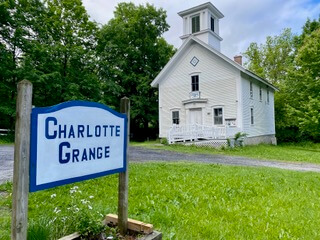Eagle Scout project at the Grange encourages reading for fun
Growing up in a small town in northern California, I have deep-rooted memories of the Grange. My family were not farmers, but then, as now, the Grange welcomed everyone who wanted to participate in the community. Dad worked on building projects; Mom organized vegetable and fruit-canning marathons and knitting projects. At meetings, families ate, shared stories and had a great time. I remember learning to square dance.
I didn’t need my master’s in English with an emphasis on Samuel Johnson and his 1755 dictionary, considered one of the most influential dictionaries in the history of the English language, to applaud the Charlotte Grange’s long-standing program, Words for Thirds, giving an age-appropriate dictionary to every third grader at Charlotte Central School, as well as home-schoolers.

After admiring this project for years, I decided I should connect this wonderful “eternal” gift with my own longtime teaching experience and writing 20+ books about the critical importance of connecting kids with books they enjoy. As a seventh-eighth grade corrective reading teacher, I insisted that our budget should go for children’s books, not publishers’ skill kits.
Besides the books filling the room, every month each child received a coupon redeemable for a paperback of choice at the local bookstore. My boss, a reader himself, only said, “Let’s hope the school board doesn’t find out.”
The point here is that instead of spending thousands of dollars on commercial skill-builder drills, we sent kids to the bookstore. Parents were first astonished and then delighted with the results.
When a program evaluator from the New York State Department of Reading came to see why student reading scores had soared, she kept asking to see “the program,” and finally I held up Shel Silverstein’s “Where the Sidewalk Ends,” and said, “This is a book everybody reads.”
She left, bewildered.
My experience with third graders grouped as the worst readers in that grade was similar. We started each day with everybody, including me, reading a book of their choice. Too many children have never seen an adult read. At first, getting children to sit with a book for 10 minutes was excruciating, but the books won, and by December, children were complaining when I called a halt after 55 minutes.
To build on Words for Thirds, I talked with my friend and Charlotte Grange member Cindi Robinson about putting up a Little Free Library for kids here in town. She was enthusiastic, and we thought the Grange Hall on Spear Street in East Charlotte Village would be an ideal location.
As part of his Eagle Scout project, Robinson’s son Stuart built this Little Free Library, carefully designed to reflect the historic Grange Hall architecture. It was installed in spring 2022, joining the network of more than 115,000 Little Free Libraries worldwide, including those in every U.S. state, to be a catalyst for building community, inspiring readers and expanding book access for all.
Our Little Free Library is supported not only by the Grange but also the Charlotte Library, the Friends of the Charlotte Senior Center and the Flying Pig Bookstore (which, you’ll remember, did get its start in Charlotte and is still a vital part of our community). We are fortunate indeed to live in a community that nourishes children in this way.
Special note to parents: There is a mountain of research showing that reading books is far and above the best — and surest — way for children to gain the multitude of discrete skills linked to reading. Noted researcher and University of Southern California emeritus professor of education Stephen Krashen puts it succinctly: “The more children read for pleasure (and that includes mostly fiction), the better they read, write and spell, and the larger their vocabularies. The more they read (again for pleasure, largely fiction), the more they know about history, literature and science, and the more they know about other cultures.”
So, encourage the children in your care to go to the Grange Hall and take a look — and bring home a book to read for the fun of it.
The Little Free Library is accessible 24 hours a day, seven days a week. Cindi Robinson monitors it regularly and replenishes it from our stockpile as needed. Of course, as in all Little Free Libraries, the idea is take one and when possible, give one back; but thanks to our special sponsors, children who visit will find new and enticing books they can call their own and keep. Just think about it: A brand-new book to take home.
And read.
(Susan Ohanian is a member of Charlotte Grange. For more information on these and other Grange programs, visit the website.)
